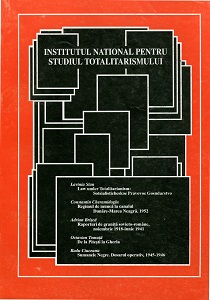Dictionar Biografic
Biographical Dictionary
Author(s): Paul CaraviaSubject(s): Military history, Political history, Social history, Recent History (1900 till today), History of Communism
Published by: Institutul National pentru Studiul Totalitarismului
Keywords: biographies; Vasile Băncilă; Corneliu Dragalina; Anton Dumitriu; Radu Gyr; Iosif lacobici; Alexandru Vaida-Voevod; Mircea Vulcănescu;
Summary/Abstract: Vasile Băncilă (1897-1979) Vasile Băncilă graduated from the Bucharest University School of Letters ad Philosophy and he was a member of the Romanian School in Fontenay-aux-Roses (1925-1927, 1929-1930); he taught philosophy and ethics and wrote many studies on sociology, aesthetics, logic, metaphysics, ethnology, teaching, ethics and art history. He was sidelined in the first wave of purges, in 1945. Corneliu Dragalina (1887-1949) He fought in World War I as captain in the Second Heavy Artillery Regiment. He was promoted to army corps general during the military operations on the eastern front in World War II. On March 20, 1943 he was appointed military governor of Bukovina, serving until August 24, 1944. In 1945 he was abusively put in reserve and spent his last years anonymously under the close scrutiny of the Ministry of the Interior surveillance bodies. Anton Dumitriu (1905-1992) Ph.D. in philosophy (1938); he was pushed into a career cul-de-sac by the Iron Guard party when they governed the country (September 1940-January 1941). During the war he was pursued by the Gestapo and the Romanian Special Intelligence Service. Paradoxically, in 1949 he was arrested by the communist authorities for “treason” and freed in 1954, but he was forbidden to publish anything. Radu Gyr (1905-1975) Radu Gyr (Demetrescu), poet, editorialist and essayist; he was a member the Iron Guard Movement and during their rule (1940-1941), he was appointed general director of the theatres and opera houses in Romania. There, he established the Barasheum Jewish Theatre in Bucharest. After the Iron Guard rebellion of January 1941 he was sentenced to 12 years imprisonment, but the sentence was commuted and he was sent to the front, in the first line of fire. After the war he was sentenced to 12 years of hard labour (until 1956), but in 1958 he was arrested again and sentenced to death. Later his sentence was commuted to penal servitude for life. He was pardoned in 1963. Iosif lacobici (1884-1952) On August 6, 1945 lacobici was questioned for war crimes by the People’s Court, on May 18, 1946 he was arrested and, after June 28, 1946 he was investigated by the General Prosecution of the Appellate Court. Although found not guilty, on September 16, 1946 an order for his apprehension was issued. He was arrested on August 12, 1948 and sentenced to eight years hard imprisonment; he died on March 11, 1952 in the hospital of the Aiud jail. Alexandru Vaida-Voevod (1872-1950) He was one of the leaders of the movement organized by the Romanian students in Vienna ( 1892-1895) and in 1896 he was elected member of the National Romanian Party leadership committee and became an MP in the Budapest Parliament. He supported the federalization of the bi-cephalous monarchy and Romania’s rapprochement to the Cental Powers.; he permanently supported the rights of the Romanians in Transylvania, under the rule of the Hapsburg monarchy. He was an active participant in the great union of 1918 ar 1 in politics between the wars; he was sidelined by the communist regime and sent into internal exile, where he died in 1950. Mircea Vulcănescu (1904-1952) While a student, he was close to the circles of nationalist students and to that of professor Nae Ionescu (Mircea Eliade, Constantin Noica, Emil Cioran). In 1942 he became general director in the Ministry of Finance; he was active in the Criterion Association of Arts, Literature and Philosophy. He was arrested in May 1946 with other dignitaries of the former Antonescu cabinet, but in August his advice was sought regarding the best position Romania could adopt at the peace negotiations in Paris. After he was re-arrested on August 30, 1946 he was sentenced to eight years of hard imprisonment and the confiscation of his property. He died in jail at Aiud on October 28, 1952.
Journal: Arhivele Totalitarismului
- Issue Year: V/1997
- Issue No: 1
- Page Range: 164-184
- Page Count: 21
- Language: Romanian
- Content File-PDF

